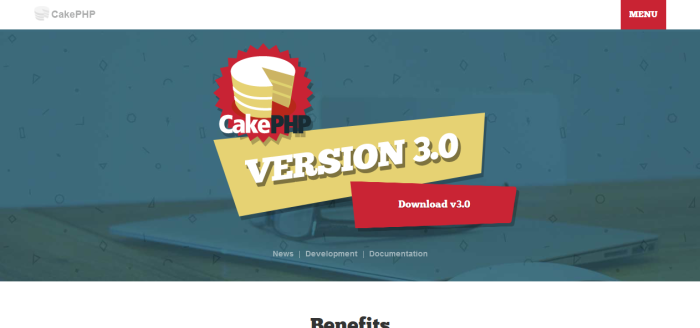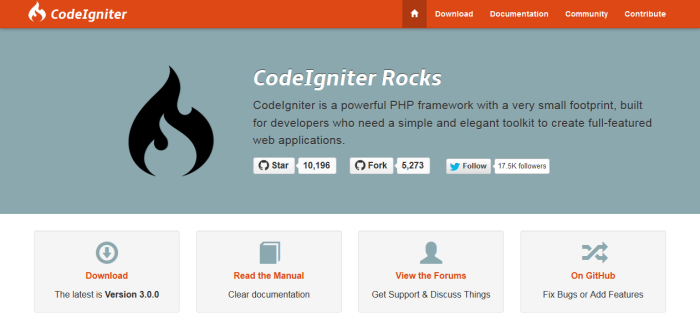
PHP framework helps developers to write clean and reusable codes. PHP follows MVC pattern, which provides a clear separation of logic and presentation. However, there is much discussion as to which is the best framework for PHP development – CakePHP, Laravel or Codeigniter. Well, this depends on whether one prefers better documentation, superior performance, built-in-functions or other features of PHP. Every framework has its pros and cons, which are discussed herewith to let you determine the right PHP tool for your web development needs.

CakePHP was one of the first PHP frameworks, founded back when the standard code was Spaghetti. The objective was to make developing websites and applications fast by minimizing the amount of code that a developer needed to write. And lesser time writing codes means more time making money!
Pros
Built-in ORM is one of the best things about CakePHP. Building queries is simple and fast, and you can get an entire blog post and all its comments in just one or two lines of code. Reverse routing feature makes maintaining links in an application so much hassle-free. Any link that uses the reverse route array will point to the right spot automatically at runtime. Extensive plugins makes reusing codes simpler and help to keep the application folder clean.
Cons
The latest versions of CakePHP are comparatively more efficient and faster, but it is still incredibly slow. It wouldn’t be surprising if your app turns down when slammed with millions of hits. There are literally tons of lines of code embedded in this PHP framework. Despite being well documented, the codes can be overwhelming. Sometimes, you may also need to use code to determine just how much it should do; otherwise, it will prompt you to do many more things.
Conclusion:CakePHP is good if you are creating a dynamic website and do not expect getting huge hits.
Also Read: 7 Benefits You Will Miss If You Do Not Opt PHP Platform For Your Web Development

Laravel is still in its nascent stage but has gathered quite popularity.
Pros
It features a simple and superfast ORM that makes working with database relations a breeze. Its built-in modularity, via bundles, makes it simple to reuse and drop in code across the application. At the same time, it is very extendable and configurable. The blade template engine is very extendable and extremely fast, which makes it easy to integrate new features without changing the core. Reverse routing and excellent documentation are other key features.
Cons
Since it is still new, it can bring some instability with coding. At the same time, routing can be odd sometimes and brings another level of complexity, IMO. Extending some classes might be trickier because the core files are all within Laravel namespace and not all the files in core use namespace slash (a ) before a call to another core file.
Conclusion: New and improved, Laravel makes developing much faster and hassle-free if you know how to overcome the cons.
Also Read: 10 Must Have Magento Extensions for Every Magento Based Website

Codeigniter is one of the most popular frameworks for PHP development and has been around for several years now.
Pros
It is extremely easy to setup and use, which minimizes the complexities for a new PHP developer. Codeigniter is superfast and extremely well documented that make development real fun.
Cons
The framework provides no modular separation by default. While Modular Extensions would do the job, you would never be 100% satisfied with the results. The 2.x broke CI is 5.1.6+ for minimum PHP version, and this, often does not work well for developers. Moreover, you can also expect to extend too many core files to have the CI working in a way you prefer.
Conclusion: Codeigniter is an effective framework to learn the nuances of PHP and OO coding, and to create small sites fairly fast and with low overhead.
If you are still confused with any of the above PHP Frameworks, then feel free to contact Satvik Infotech. We have
highly experienced PHP developers to solve your queries. Contact us today!
 PHP framework helps developers to write clean and reusable codes. PHP follows MVC pattern, which provides a clear separation of logic and presentation. However, there is much discussion as to which is the best framework for PHP development – CakePHP, Laravel or Codeigniter. Well, this depends on whether one prefers better documentation, superior performance, built-in-functions or other features of PHP. Every framework has its pros and cons, which are discussed herewith to let you determine the right PHP tool for your web development needs.
PHP framework helps developers to write clean and reusable codes. PHP follows MVC pattern, which provides a clear separation of logic and presentation. However, there is much discussion as to which is the best framework for PHP development – CakePHP, Laravel or Codeigniter. Well, this depends on whether one prefers better documentation, superior performance, built-in-functions or other features of PHP. Every framework has its pros and cons, which are discussed herewith to let you determine the right PHP tool for your web development needs.
 CakePHP was one of the first PHP frameworks, founded back when the standard code was Spaghetti. The objective was to make developing websites and applications fast by minimizing the amount of code that a developer needed to write. And lesser time writing codes means more time making money!
Pros
Built-in ORM is one of the best things about CakePHP. Building queries is simple and fast, and you can get an entire blog post and all its comments in just one or two lines of code. Reverse routing feature makes maintaining links in an application so much hassle-free. Any link that uses the reverse route array will point to the right spot automatically at runtime. Extensive plugins makes reusing codes simpler and help to keep the application folder clean.
Cons
The latest versions of CakePHP are comparatively more efficient and faster, but it is still incredibly slow. It wouldn’t be surprising if your app turns down when slammed with millions of hits. There are literally tons of lines of code embedded in this PHP framework. Despite being well documented, the codes can be overwhelming. Sometimes, you may also need to use code to determine just how much it should do; otherwise, it will prompt you to do many more things.
Conclusion:CakePHP is good if you are creating a dynamic website and do not expect getting huge hits.
Also Read: 7 Benefits You Will Miss If You Do Not Opt PHP Platform For Your Web Development
CakePHP was one of the first PHP frameworks, founded back when the standard code was Spaghetti. The objective was to make developing websites and applications fast by minimizing the amount of code that a developer needed to write. And lesser time writing codes means more time making money!
Pros
Built-in ORM is one of the best things about CakePHP. Building queries is simple and fast, and you can get an entire blog post and all its comments in just one or two lines of code. Reverse routing feature makes maintaining links in an application so much hassle-free. Any link that uses the reverse route array will point to the right spot automatically at runtime. Extensive plugins makes reusing codes simpler and help to keep the application folder clean.
Cons
The latest versions of CakePHP are comparatively more efficient and faster, but it is still incredibly slow. It wouldn’t be surprising if your app turns down when slammed with millions of hits. There are literally tons of lines of code embedded in this PHP framework. Despite being well documented, the codes can be overwhelming. Sometimes, you may also need to use code to determine just how much it should do; otherwise, it will prompt you to do many more things.
Conclusion:CakePHP is good if you are creating a dynamic website and do not expect getting huge hits.
Also Read: 7 Benefits You Will Miss If You Do Not Opt PHP Platform For Your Web Development
 Laravel is still in its nascent stage but has gathered quite popularity.
Pros
It features a simple and superfast ORM that makes working with database relations a breeze. Its built-in modularity, via bundles, makes it simple to reuse and drop in code across the application. At the same time, it is very extendable and configurable. The blade template engine is very extendable and extremely fast, which makes it easy to integrate new features without changing the core. Reverse routing and excellent documentation are other key features.
Cons
Since it is still new, it can bring some instability with coding. At the same time, routing can be odd sometimes and brings another level of complexity, IMO. Extending some classes might be trickier because the core files are all within Laravel namespace and not all the files in core use namespace slash (a ) before a call to another core file.
Conclusion: New and improved, Laravel makes developing much faster and hassle-free if you know how to overcome the cons.
Also Read: 10 Must Have Magento Extensions for Every Magento Based Website
Laravel is still in its nascent stage but has gathered quite popularity.
Pros
It features a simple and superfast ORM that makes working with database relations a breeze. Its built-in modularity, via bundles, makes it simple to reuse and drop in code across the application. At the same time, it is very extendable and configurable. The blade template engine is very extendable and extremely fast, which makes it easy to integrate new features without changing the core. Reverse routing and excellent documentation are other key features.
Cons
Since it is still new, it can bring some instability with coding. At the same time, routing can be odd sometimes and brings another level of complexity, IMO. Extending some classes might be trickier because the core files are all within Laravel namespace and not all the files in core use namespace slash (a ) before a call to another core file.
Conclusion: New and improved, Laravel makes developing much faster and hassle-free if you know how to overcome the cons.
Also Read: 10 Must Have Magento Extensions for Every Magento Based Website
 Codeigniter is one of the most popular frameworks for PHP development and has been around for several years now.
Pros
It is extremely easy to setup and use, which minimizes the complexities for a new PHP developer. Codeigniter is superfast and extremely well documented that make development real fun.
Cons
The framework provides no modular separation by default. While Modular Extensions would do the job, you would never be 100% satisfied with the results. The 2.x broke CI is 5.1.6+ for minimum PHP version, and this, often does not work well for developers. Moreover, you can also expect to extend too many core files to have the CI working in a way you prefer.
Conclusion: Codeigniter is an effective framework to learn the nuances of PHP and OO coding, and to create small sites fairly fast and with low overhead.
If you are still confused with any of the above PHP Frameworks, then feel free to contact Satvik Infotech. We have highly experienced PHP developers to solve your queries. Contact us today!
Codeigniter is one of the most popular frameworks for PHP development and has been around for several years now.
Pros
It is extremely easy to setup and use, which minimizes the complexities for a new PHP developer. Codeigniter is superfast and extremely well documented that make development real fun.
Cons
The framework provides no modular separation by default. While Modular Extensions would do the job, you would never be 100% satisfied with the results. The 2.x broke CI is 5.1.6+ for minimum PHP version, and this, often does not work well for developers. Moreover, you can also expect to extend too many core files to have the CI working in a way you prefer.
Conclusion: Codeigniter is an effective framework to learn the nuances of PHP and OO coding, and to create small sites fairly fast and with low overhead.
If you are still confused with any of the above PHP Frameworks, then feel free to contact Satvik Infotech. We have highly experienced PHP developers to solve your queries. Contact us today!